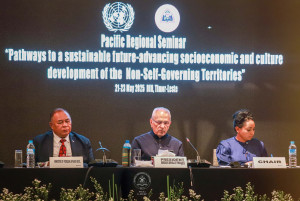Timor-Leste Hosts United Nations Pacific Regional Seminar on Decolonization

On Wednesday, May 21st, 2025, in Dili, it took place the Pacific Regional Seminar on Decolonization, promoted by the United Nations Special Committee on Decolonization (C-24), in partnership with the Government of Timor-Leste, under the theme ‘Pathways to a sustainable future – promoting the socio-economic and cultural development of Non-Self-Governing Territories.’
The seminar, which runs until May 23rd, brings together representatives from Member States, Non-Self-Governing Territories, administering powers, specialized agencies of the United Nations, regional organizations and experts, with around 100 participants from almost 50 countries. The aim is to gather contributions on policies and practical means that can accelerate the decolonization process and strengthen political, economic, social and cultural development in territories still under external administration.
The opening session was chaired by the President of the Republic, José Ramos-Horta, who highlighted the importance of the seminar as a platform for renewing the international commitment to the right to self-determination. ‘Timor-Leste firmly believes that the decolonization process remains incomplete as long as there are people whose free and genuine will has not been heard, respected and implemented. The defense of these principles is not only a historical duty, but a vital contribution to the construction of a more just, inclusive and respectful international system,’ said the President of the Republic.
The Head of State also argued that ‘the experience of Timor-Leste shows that lasting peace comes from respecting the will of the people and is built on social justice, economic opportunity, and cultural freedom.’
The Minister of Foreign Affairs and Cooperation, Bendito dos Santos Freitas, reiterated Timor-Leste's commitment to sustainable development and respect for the cultural identities of peoples. ‘Our independence, achieved in 2002, was not just a political milestone — it was a testament to the resilient spirit of our people and their unwavering pursuit of freedom and dignity. Since then, we have remained committed to building a nation that honors its history and embraces the promise of the future,’ said Minister Bendito Freitas.
The Minister concluded his speech by expressing his hope that ‘this meeting will be more than just a dialogue. May it be a turning point — a moment when our collaboration lays the foundations for a sustainable and inclusive future. A future that honors our past, enriches our present and ensures a better tomorrow for generations to come.
The moderator of the meeting, Menissa Rambally, Permanent Representative of Saint Lucia to the United Nations and Chair of the Special Committee, led the proceedings of the first session, which included high-level interventions and presentations on strategies and good practices in support of Non-Self-Governing Territories.
The seminar agenda includes an analysis of the role of the C-24 in promoting socio-economic and cultural development, an assessment of regional and global perspectives of administering powers and territories, and the contribution of the United Nations to the creation of practical and achievable solutions. The discussions will also focus on sharing experiences of decolonization, such as that of Timor-Leste, which has gone from being a non-self-governing territory to an active member of the Committee, remaining a voice of solidarity with other peoples in similar situations.
The conclusions of the seminar will serve as a basis for the drafting of recommendations to be presented to the UN General Assembly within the framework of the Fourth International Decade for the Eradication of Colonialism (2021–2030), proclaimed by Resolution 75/123, with the aim of strengthening international cooperation and ensuring that the rights of the peoples of Non-Self-Governing Territories are fully respected.










































